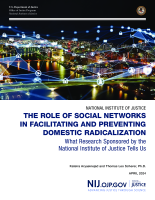Research programs
Adolescent Contact, Lasting Impact? Lessons Learned From Two Longitudinal Studies Spanning 20 Years of Developmental Science Research With Justice-System-Involved Youths
Building Knowledge About Victim Services
Webinar Transcript: FY 2024 NIJ Graduate Research Fellowship Program
Deadline notice
The deadline to submit an application under the solicitation discussed below has passed.
NIJ held a webinar on February 14, 2024, gave an overview of NIJ’s Graduate Research Fellowship opportunity, which invites applications for doctoral dissertation research that is relevant to preventing and controlling crime, advancing knowledge of victimization and effective victim services, or ensuring the fair and impartial administration...
NIJ FY24 W.E.B. Du Bois Program of Research on Reducing Racial and Ethnic Disparities in the Justice System
Group Work in Research: Creating a Research Family
Methodology for Detecting Residual Phosphoric Acid in Polybenzoxazole Fibers
Are Microbiome Studies Ready for Hypothesis-Driven Research?
National Institute of Justice Commemorates the 15th Anniversary of the Violence Against Women Act
Accounting for Covariates in Forensic Error Rate
Just Science Podcast: Just Footwear Impressions on Fabric
Webinar: NIJ Research Assistantship Program Informational Webinar
This recorded webinar, originally held September 28, 2023, provides information on NIJ’s Research Assistantship Program, which offers highly qualified doctoral students the opportunity to bring their expertise to NIJ to work across offices and program areas to obtain a practical and applied research experience. The program is a research focused professional development opportunity for doctoral students from all academic disciplines. NIJ...
Study Protocol for an Evaluability Assessment of an Anti-human Trafficking Program
Exploring the Impact of Station Dog Programs on Agency Wellness and Community Relationships
Forensic Technology Center of Excellence, Fiscal Year 2021
Inclusive Research: Engaging People Closest to the Issue Makes for Better Science & Greater Impact; 2023 NIJ Research Conference Plenary
This panel will discuss what inclusive research is, how to conduct it, and what issues and challenges exist about engaging in it. “Inclusive research” has its history as a participatory research method designed to ensure people closest to the issue or problem under study are authentically engaged in the research process rather than simply being “research subjects.” While community-based participatory research has begun to take on greater prominence in the criminal justice realm, such efforts are largely confined to qualitative research inquiries.
See the YouTube Terms of Service and Google Privacy Policy





